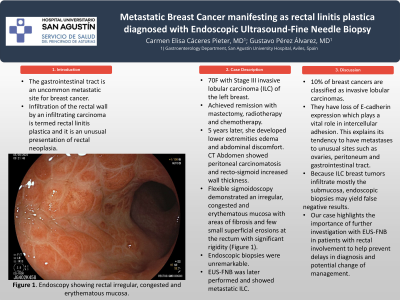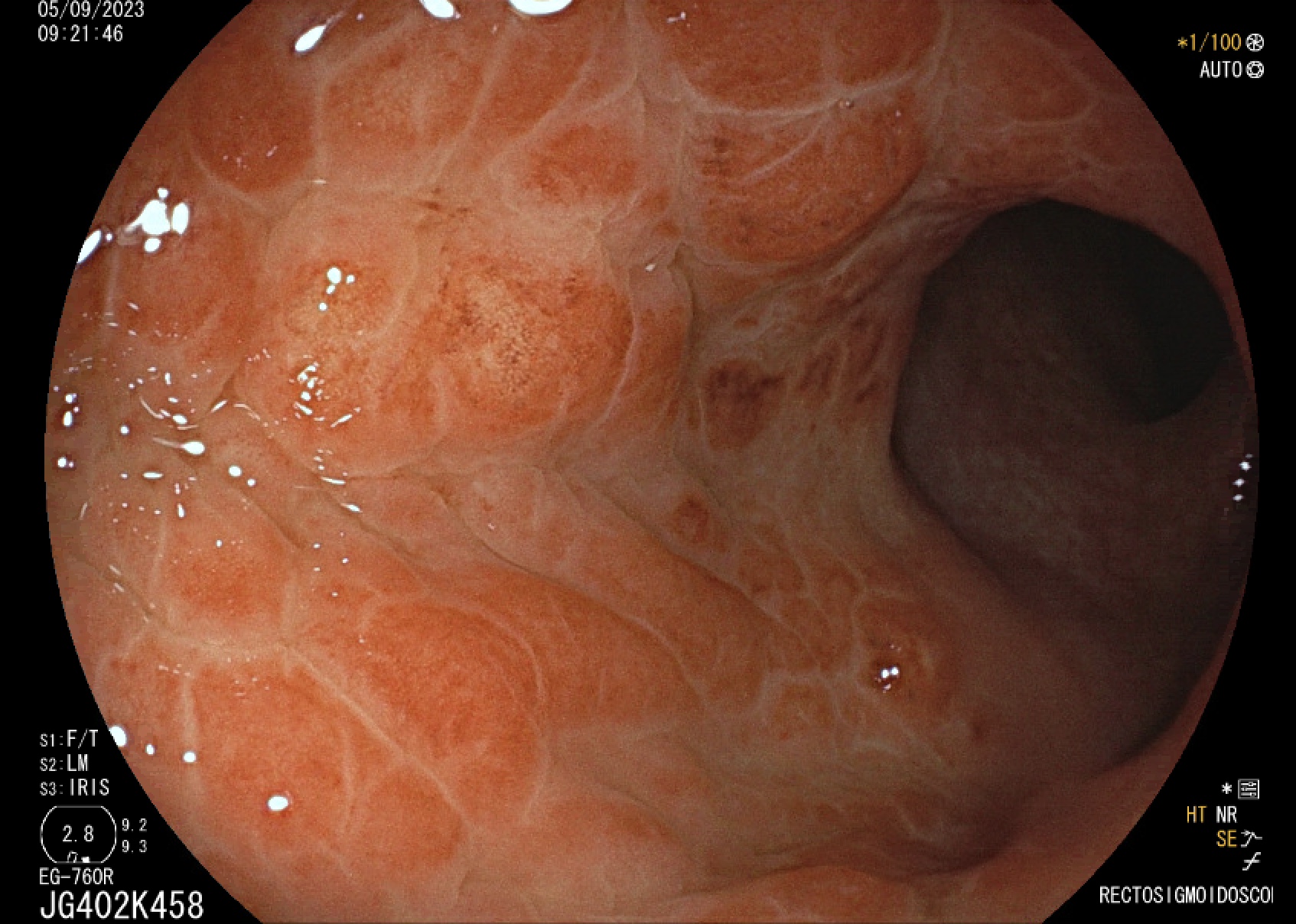Sunday Poster Session
Category: Colon
P0363 - Metastatic Breast Cancer Manifesting as Rectal Linitis Plastica Diagnosed With Endoscopic Ultrasound- Fine Needle Biopsy
Sunday, October 27, 2024
3:30 PM - 7:00 PM ET
Location: Exhibit Hall E

Has Audio
- CC
Carmen Elisa Caceres Pieter, MD
Hospital Universitario San Agustín
Aviles, Asturias, Spain
Presenting Author(s)
Carmen Elisa Caceres Pieter, MD, Gustavo Pérez Álvarez, MD
Hospital Universitario San Agustín, Aviles, Asturias, Spain
Introduction: The gastrointestinal tract is an uncommon metastatic site for breast cancer. Infiltration of the rectal wall by an infiltrating carcinoma is termed rectal linitis plastica and it is an unusual presentation of rectal neoplasia. We present a case of invasive lobular carcinoma (ILC) of the breast with metastatic disease at the rectum.
Case Description/Methods: We present the case of a 70 years old female with Stage III invasive lobular carcinoma of the left breast. The tumor is HER-2 negative, positive estrogen and progesterone receptor mutations and E-cadherin mutation positive. She was treated with a left simple mastectomy with lymph nodes resection, radiotherapy, chemotherapy with paclitaxel, doxorubicin and cyclophosphamide and subsequent letrozole with complete remission of her disease. 5 years after diagnosis, she developed lower extremities edema and abdominal discomfort for which a CT Abdomen was performed and showed peritoneal carcinomatosis and recto-sigmoid increased wall thickness. Repeat breast cancer tumor markers such as CA 15:3 ( >300 UI/mL), CEA (200 ng/mL) and CA125 (80 UI/m) were found to be elevated. A flexible sigmoidoscopy was performed and demonstrated an irregular, congested and erythematous mucosa with areas of fibrosis and few small superficial erosions at the rectum with significant rigidity (Figure 1). Endoscopic biopsies were unremarkable. Endoscopic Ultrasound-guided fine needle biopsy (EUS-FNB) was later performed and showed metastatic ILC. She continues to follow up with Hematology-Oncology and she was started on capecitabine.
Discussion: Around 10% of breast cancers are classified as invasive lobular carcinomas. These have a very unique biology as they have loss of E-cadherin expression which plays a vital role in intercellular adhesion. This also partly explains its tendency to have metastases to unusual sites such as ovaries, peritoneum and gastrointestinal tract. Because ILC breast tumors infiltrate mostly the submucosa, endoscopic biopsies may yield false negative results. Our case highlights the importance of further investigation with EUS-FNB in patients with rectal involvement in the setting of invasive lobular carcinoma to help prevent delays in diagnosis and potential change of management.

Disclosures:
Carmen Elisa Caceres Pieter, MD, Gustavo Pérez Álvarez, MD. P0363 - Metastatic Breast Cancer Manifesting as Rectal Linitis Plastica Diagnosed With Endoscopic Ultrasound- Fine Needle Biopsy, ACG 2024 Annual Scientific Meeting Abstracts. Philadelphia, PA: American College of Gastroenterology.
Hospital Universitario San Agustín, Aviles, Asturias, Spain
Introduction: The gastrointestinal tract is an uncommon metastatic site for breast cancer. Infiltration of the rectal wall by an infiltrating carcinoma is termed rectal linitis plastica and it is an unusual presentation of rectal neoplasia. We present a case of invasive lobular carcinoma (ILC) of the breast with metastatic disease at the rectum.
Case Description/Methods: We present the case of a 70 years old female with Stage III invasive lobular carcinoma of the left breast. The tumor is HER-2 negative, positive estrogen and progesterone receptor mutations and E-cadherin mutation positive. She was treated with a left simple mastectomy with lymph nodes resection, radiotherapy, chemotherapy with paclitaxel, doxorubicin and cyclophosphamide and subsequent letrozole with complete remission of her disease. 5 years after diagnosis, she developed lower extremities edema and abdominal discomfort for which a CT Abdomen was performed and showed peritoneal carcinomatosis and recto-sigmoid increased wall thickness. Repeat breast cancer tumor markers such as CA 15:3 ( >300 UI/mL), CEA (200 ng/mL) and CA125 (80 UI/m) were found to be elevated. A flexible sigmoidoscopy was performed and demonstrated an irregular, congested and erythematous mucosa with areas of fibrosis and few small superficial erosions at the rectum with significant rigidity (Figure 1). Endoscopic biopsies were unremarkable. Endoscopic Ultrasound-guided fine needle biopsy (EUS-FNB) was later performed and showed metastatic ILC. She continues to follow up with Hematology-Oncology and she was started on capecitabine.
Discussion: Around 10% of breast cancers are classified as invasive lobular carcinomas. These have a very unique biology as they have loss of E-cadherin expression which plays a vital role in intercellular adhesion. This also partly explains its tendency to have metastases to unusual sites such as ovaries, peritoneum and gastrointestinal tract. Because ILC breast tumors infiltrate mostly the submucosa, endoscopic biopsies may yield false negative results. Our case highlights the importance of further investigation with EUS-FNB in patients with rectal involvement in the setting of invasive lobular carcinoma to help prevent delays in diagnosis and potential change of management.

Figure: Figure 1. Endoscopy showing rectal irregular, congested and erythematous mucosa.
Disclosures:
Carmen Elisa Caceres Pieter indicated no relevant financial relationships.
Gustavo Pérez Álvarez indicated no relevant financial relationships.
Carmen Elisa Caceres Pieter, MD, Gustavo Pérez Álvarez, MD. P0363 - Metastatic Breast Cancer Manifesting as Rectal Linitis Plastica Diagnosed With Endoscopic Ultrasound- Fine Needle Biopsy, ACG 2024 Annual Scientific Meeting Abstracts. Philadelphia, PA: American College of Gastroenterology.
